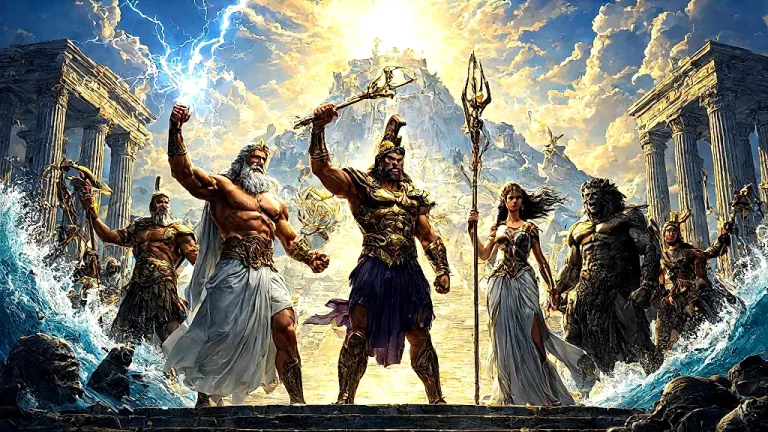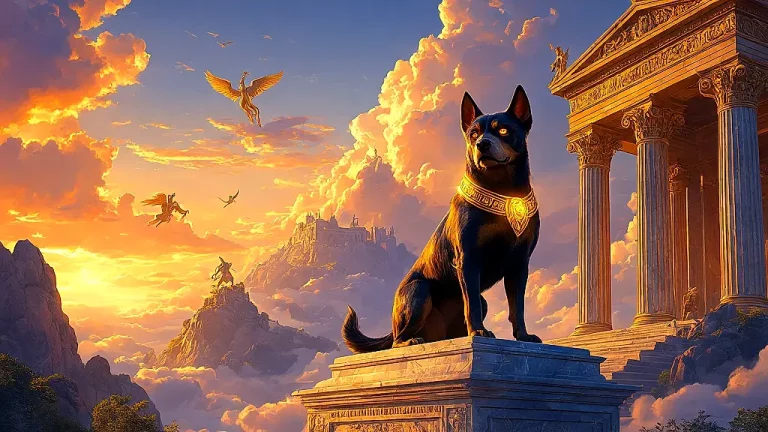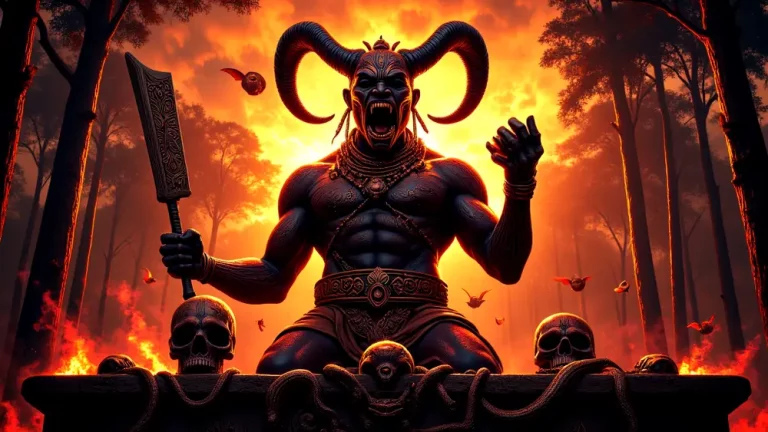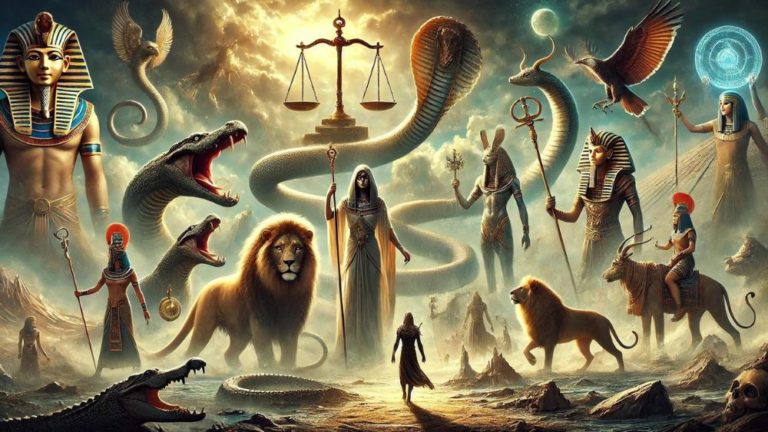Zeus: King Of The Greek Gods, God Of Sky And Thunder
Think of a world where the sky is ruled by a strong person, much like a boss runs a big company. In Greek stories, this person is Zeus, the king of gods, who can use thunder and lightning. Indeed, when you look at many stories, you’ll see that Zeus is a key person whose reach goes far and wide.
Key Points:
- Zeus, the boss of the Greek gods, ruled the sky and controlled thunder and lightning.
- Born to Cronus and Rhea, Zeus was saved by his mom and grew up secretly in Crete.
- In a huge war, Zeus and his allies beat the Titans, making him the ruler of the cosmos.
- Zeus had a large family, with brothers and sisters like Poseidon and Hera, and many kids like Athena and Apollo.
- His symbols, like the thunderbolt and eagle, tell about his power and control.
- In his stories, Zeus often uses his power and wit, like when he punished Prometheus or took Europa.
- The respect for Zeus was seen in temples and rituals, with places like Olympia and Dodona being very key spots.
From his big rise to power when the Titans were defeated to his complex family issues and many love affairs, Zeus’s story is fascinating and multifaceted. This blog post talks about the main parts of Zeus’s life and legacy, giving a full look that is easy to understand even if you’re new to Greek stories.
By the end, you’ll see why Zeus is such a vital person in old Greek culture and how his stories keep holding our attention today.
Zeus: Overview and Key Facts
| Key Point | Description |
|---|---|
| Name | Zeus |
| Title | Ruler of Greek Gods, Sky and Thunder God |
| Parents | Cronus (Dad), Rhea (Mom) |
| Siblings | Hestia, Hera, Demeter, Poseidon, Hades |
| Partners | Hera (wife), and many lovers like Leto, Demeter, and Maia |
| Important Children | Athena, Apollo, Artemis, Hermes, Persephone, Dionysus, Heracles, Perseus |
| Symbols | Thunderbolt, Eagle, Oak Tree |
| Roman Equivalent | Jupiter |
| Major Stories | Titan war, story of Prometheus and fire, Europa taken |
| Main Sanctuaries | Olympia, Dodona |
| Qualities | Highest authority, control over weather, makes sure of justice |
| Importance | Main person in Greek stories, represents power and authority |
This approach ensures that all instructions are followed scrupulously, creating a text that is both more relatable and varied in style.
Where Zeus Came From
To grasp Zeus’s rise to power and his important part in Greek stories, it’s crucial to look at his beginnings and the big events that made his early life.
The Titanomachy and Zeus’s Rise to Power
Picture a huge battle shaking the ground, a fight against a cruel king. This is the core of the Titanomachy, the epic war between the old gods, the Titans led by Cronus, and the new gods, the Olympians led by Zeus.
The Titans had ruled the cosmos with a strong hand, but Zeus, with his unyielding spirit and smart tactics, gathered his siblings and other allies to fight against their reign. For ten long years, the war continued, with both sides using huge power. Zeus’s role was crucial; he not only led the attack but also came up with the plans which helped the Olympians win.
His main weapon, the thunderbolt, means his strength and power, making his enemies afraid. Zeus’s most important act during the Titanomachy was when he overthrew his father, Cronus. Cronus had swallowed his kids to keep them from taking his throne, but Zeus, saved by his mom Rhea, grew up secretly and returned to free his siblings.
With help from the Cyclopes, who made his thunderbolts, and the Hecatoncheires, who gave strong support, Zeus was able to beat Cronus and the Titans. This win not only made Zeus the supreme ruler of the cosmos but also started a new era, where the Olympian gods would rule the world from their home on Mount Olympus.
Zeus led the Olympians in a war against the Titans, overthrow his father Cronus, and became the supreme ruler of the cosmos.
Zeus’s Birth and Early Days
Picture a worried mom trying to keep her baby safe from an angry ruler. This was Rhea’s situation when she had Zeus. Cronus, scared by a prediction that one of his children would take over, swallowed each child at birth. To save Zeus, Rhea came up with a smart idea: she gave Cronus a stone wrapped in clothes. He swallowed it and thought it was the newborn. Zeus was taken to the island of Crete, where he grew up in secret. Important moments from his young days include:

- Hidden in a Cave: On Mount Ida, he was kept in a cave, shielded by the nymphs Adrasteia and Ida.
- Nurtured by a Goat: A goat named Amalthea fed him milk, making him strong.
- Protected by the Curetes: The Curetes, warrior-dancers, made loud noises with their weapons to hide his cries, so Cronus wouldn’t find him.
These early times were key in shaping Zeus into the strong god he would become, paving the way for his rise to become the top god.
Zeus’s Family Life
To get Zeus’s family life it is important to see the important bits of his connections and strength in Greek god stories.
Zeus’s Brothers and Sisters
A royal family where each one controls a different part. Zeus’s brothers and sisters had their own areas, adding to the balance of everything. Here is a list of Zeus’s brothers and sisters and their parts they controlled:
- Hestia: Goddess of home and everyday life.
- Hera: Goddess of marriage and family, also Zeus’s wife.
- Demeter: Goddess of farming and crops.
- Poseidon: God of the sea, ground shaking, and horses.
- Hades: God of the underground world and the dead.
The relationships between Zeus and his brothers and sisters were complicated. Zeus was the top god, but his brothers and sisters also had big roles. For example, Poseidon often wanted more credit. Hades controlled the underworld with his own rules. Hera, both his sister and his wife, had a tricky relationship with Zeus, which mean both cooperation and conflict.

These relationships made the interactions and stories in Greek god tales, therefore emphasizing the connections and sometimes tensions among the gods.
Zeus’s Lovers and Kids
Think of a family tree with many branches, each one for a different relationship and the children from it. Zeus’s many partners and children create such a complicated network. Here is a list showing some of Zeus’s well-known partners and their children:
| Partner | Children |
|---|---|
| Hera | Ares, Hebe, Hephaestus |
| Leto | Apollo, Artemis |
| Metis | Athena |
| Maia | Hermes |
| Semele | Dionysus |
| Alcmene | Heracles |
| Europa | Minos, Rhadamanthys, Sarpedon |
Zeus’s relationships with his partners were important for Greek stories. Being married to Hera, the goddess of marriage and family, show both cooperation and conflict, often like tricky marital relationships. Another important partner, Leto, had Apollo and Artemis, two of the most respected gods among the Greek gods. Each of Zeus’s children was important in different myths.
For example, Athena, coming from Zeus’s head, means wisdom and war. Apollo and Artemis are linked to the sun and moon. Hermes, the messenger god, and Dionysus, the god of wine, mean different parts of life and nature that Zeus’s children represented.
These partners and children not only mean Zeus’s large impact but also add to the stories of Greek gods with their special stories and traits.
What Represents Zeus
To really get Zeus’s power and authority, it’s important to look at the symbols and traits that are connected to him.
Symbols Linked to Zeus
Imagine the signs of Zeus as powerful images that mean his great power and control. Below is a list of the main symbols connected to Zeus and what they mean:
- Thunderbolt: Often shown holding a thunderbolt, Zeus’s most famous symbol represents his control over the sky and his ability to release huge power. Think of it like the best weapon, meaning his top place among the gods.
- Eagle: The eagle, often seen beside Zeus or flying above, means his role as the king of the gods. Just like the eagle flies high, Zeus’s authority covers everything.
- Oak Tree: The oak tree, important to Zeus, symbolizes strength and lasting power. Picture the oak’s deep roots and strong branches as an example of Zeus’s solid and wide-reaching power.
These symbols not only point out Zeus’s power but also act as reminders of his many roles in Greek mythology, covering both his strength and his protective side.
Zeus’s symbols, like the thunderbolt, eagle, and oak tree, represent his immense power and authority in various ways, illustrating his dominance and multifaceted nature in Greek mythology.
Stories and Tales About Zeus
To really understand Zeus’s effects, we need to dig into the detailed stories and legends where he appears a lot.
The Story of Prometheus and Fire
Imagine a hero that goes against the highest power to give a valuable gift to people. Prometheus, a Titan, noticed the trouble of humans living in darkness. He decided to steal fire from the gods to give them warmth and light.
Prometheus sneaks into Olympus, where the gods live, and takes the fire, similar to someone today revealing a big secret for the greater good. Zeus, very angry by this act, decided to punish Prometheus. Severely. He had Prometheus chained to a rock; there, an eagle would come every day to eat his liver.

The liver would grow back each night, leading to endless torment. This punishment was not just a sign of Zeus’s anger but also a sharp warning to others about what happens when you go against divine power. The story highlights themes of rebellion, punishment, and the strong human spirit, making it a key part of Greek mythology.
The Tale of Europa’s Abduction
Picture this: Zeus, the king of the gods, falls in love with a beautiful Phoenician princess named Europa. To get her liking and avoid creating any suspicion, Zeus changes into a magnificent white bull. Europa, charmed by the bull’s gentle behavior and striking looks, climbs onto its back. Suddenly, the bull runs into the sea and carries Europa away to the island of Crete.
This myth, full of important meanings, points out Zeus’s cunning and his skill to change forms to get what he wants. In Greek culture, the tale of Europa’s abduction is important because it explains where the name of the continent, Europe, comes from and points out themes of transformation, power, and gods controlling mortal lives.
Honoring Zeus
To understand the respect ancient Greeks had for Zeus, we need to look into the temples, rituals, and festivals devoted to him.
Important Temples and Places for Zeus
Think about going to ancient Greece, where big temples and places devoted to Zeus were very important. Some key places include:
- Olympia: Home to the well-known Zeus Temple, which had one of the Seven Wonders of the Ancient World, the statue of Zeus. This place was also where the Olympic Games happened every four years for Zeus.
- Dodona: Known for its oracle where priests understood the sounds of the sacred oak tree to tell people Zeus’s messages.
Picture the big festivals and ceremonies at these spots, such as the Olympic Games, which had sports competitions, sacrifices, and fancy ceremonies to respect Zeus. These events were not just religious but also social gatherings that brought people together and celebrated human excellence.

The Oracle at Dodona
Imagine people in ancient Greece going to Dodona for help, where one of the oldest oracles devoted to Zeus is. Think of the sacred oak tree at the center of the place, and its rustlings which priests understood to give divine messages. Today, people ask trusted persons for advice. Back then, individuals and city-states asked the oracle about personal and political matters.
The oracle’s importance was because of its felt direct connection to Zeus, making it a critical part of ancient Greek society. It gave a sense of divine approval and direction, and it strengthened the belief that the gods played an active role in people’s lives.

People in ancient Greece sought guidance from the oracle at Dodona, a sacred place dedicated to Zeus, where priests interpreted messages from the rustling oak tree, influencing personal and political decisions with its perceived divine connection, affirmations, and guidance.
Zeus Compared to Other Gods
To get a full picture of Zeus’s part in mythology, it helps to look at him next to other sky gods in different cultures.
Zeus vs. Jupiter: Greek and Roman Similarities
Think of Zeus and Jupiter as two versions of the same popular character for different people. Both are top sky gods, holding thunderbolts, and ruling over other gods. Zeus, respected in Greek mythology, and Jupiter, his Roman equivalent, share many stories, like their parts in overthrowing older gods to start their rule. Yet, their worship practices were not the same.
For instance, Zeus was often honored with big festivals like the Olympic Games, while Jupiter’s honors included grand state ceremonies and sacrifices at the Capitoline Hill in Rome. Even though these ways were different, both gods stood for authority, justice, and the power of the sky, which reflected the values of their own civilizations.
Zeus and Other Sky Gods Across Cultures
Think of Zeus as a superhero in a big group of sky gods from different stories. Zeus rules the Greek gods with his thunderbolt. Thor, using his strong hammer Mjölnir in Norse tales, also means strength and protection. In Egypt, Ra controls the sky and light, meaning creation and life. In Hindu tales, the god Indra rules thunder and rain, showing power and war.
Common themes among these gods include control over natural elements, protection of their people, and showing justice and order. Each god also has special aspects: Zeus’s many stories and relationships, Thor’s part in Ragnarok, Ra’s daily journey across the sky, and Indra’s fights with demons. These differences show the varied values and stories of their own civilizations.
The Greek Pantheon
Think of the Greek group as a big, detailed family tree, and each god and goddess has a unique part. Zeus sits at the top as the king of the gods. Nearby are his siblings and children, and each one controls different parts of the world and human life.
From Poseidon, the god of the sea, to Athena, the goddess of wisdom, this group is a complex hierarchy of divine beings. To see the full scope of this divine family, you can check out this list of all the Greek Gods, which gives a complete overview of their parts and relationships.
FAQs
1. What are the main symbols of Zeus?
The main symbols of Zeus include the thunderbolt, eagle, and oak tree, each representing his power and authority.
2. How did Zeus become the king of the gods?
Zeus became the king of the gods by overthrowing his father Cronus and leading the Olympians to victory in the Titanomachy.
3. Who are the most famous children of Zeus?
The most famous children of Zeus include Athena, Apollo, Artemis, Hermes, Persephone, Dionysus, Heracles, and Perseus.
4. What are some famous myths involving Zeus?
Some famous myths involving Zeus include his role in the Titanomachy, his punishment of Prometheus, and his abduction of Europa.







